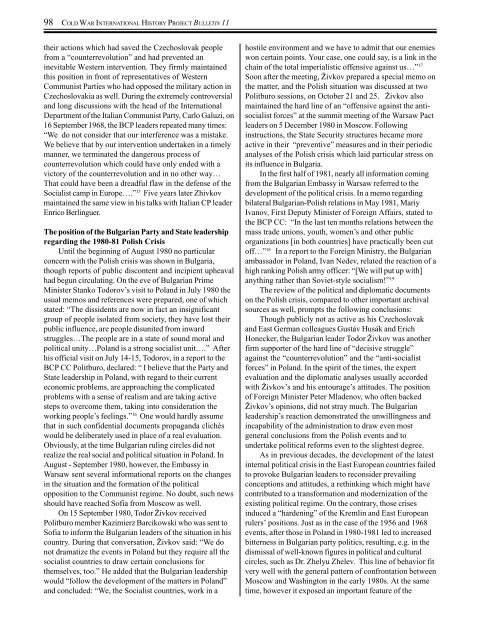The Anoshkin Notebook on the Polish Crisis, December 1981
The Anoshkin Notebook on the Polish Crisis, December 1981
The Anoshkin Notebook on the Polish Crisis, December 1981
You also want an ePaper? Increase the reach of your titles
YUMPU automatically turns print PDFs into web optimized ePapers that Google loves.
98 COLD WAR INTERNATIONAL HISTORY PROJECT BULLETIN 11<br />
<strong>the</strong>ir acti<strong>on</strong>s which had saved <strong>the</strong> Czechoslovak people<br />
from a “counterrevoluti<strong>on</strong>” and had prevented an<br />
inevitable Western interventi<strong>on</strong>. <str<strong>on</strong>g>The</str<strong>on</strong>g>y firmly maintained<br />
this positi<strong>on</strong> in fr<strong>on</strong>t of representatives of Western<br />
Communist Parties who had opposed <strong>the</strong> military acti<strong>on</strong> in<br />
Czechoslovakia as well. During <strong>the</strong> extremely c<strong>on</strong>troversial<br />
and l<strong>on</strong>g discussi<strong>on</strong>s with <strong>the</strong> head of <strong>the</strong> Internati<strong>on</strong>al<br />
Department of <strong>the</strong> Italian Communist Party, Carlo Galuzi, <strong>on</strong><br />
16 September 1968, <strong>the</strong> BCP leaders repeated many times:<br />
“We do not c<strong>on</strong>sider that our interference was a mistake.<br />
We believe that by our interventi<strong>on</strong> undertaken in a timely<br />
manner, we terminated <strong>the</strong> dangerous process of<br />
counterrevoluti<strong>on</strong> which could have <strong>on</strong>ly ended with a<br />
victory of <strong>the</strong> counterrevoluti<strong>on</strong> and in no o<strong>the</strong>r way…<br />
That could have been a dreadful flaw in <strong>the</strong> defense of <strong>the</strong><br />
Socialist camp in Europe….” 15 Five years later Zhivkov<br />
maintained <strong>the</strong> same view in his talks with Italian CP leader<br />
Enrico Berlinguer.<br />
<str<strong>on</strong>g>The</str<strong>on</strong>g> positi<strong>on</strong> of <strong>the</strong> Bulgarian Party and State leadership<br />
regarding <strong>the</strong> 1980-81 <strong>Polish</strong> <strong>Crisis</strong><br />
Until <strong>the</strong> beginning of August 1980 no particular<br />
c<strong>on</strong>cern with <strong>the</strong> <strong>Polish</strong> crisis was shown in Bulgaria,<br />
though reports of public disc<strong>on</strong>tent and incipient upheaval<br />
had begun circulating. On <strong>the</strong> eve of Bulgarian Prime<br />
Minister Stanko Todorov’s visit to Poland in July 1980 <strong>the</strong><br />
usual memos and references were prepared, <strong>on</strong>e of which<br />
stated: “<str<strong>on</strong>g>The</str<strong>on</strong>g> dissidents are now in fact an insignificant<br />
group of people isolated from society, <strong>the</strong>y have lost <strong>the</strong>ir<br />
public influence, are people disunited from inward<br />
struggles…<str<strong>on</strong>g>The</str<strong>on</strong>g> people are in a state of sound moral and<br />
political unity…Poland is a str<strong>on</strong>g socialist unit….” After<br />
his official visit <strong>on</strong> July 14-15, Todorov, in a report to <strong>the</strong><br />
BCP CC Politburo, declared: “ I believe that <strong>the</strong> Party and<br />
State leadership in Poland, with regard to <strong>the</strong>ir current<br />
ec<strong>on</strong>omic problems, are approaching <strong>the</strong> complicated<br />
problems with a sense of realism and are taking active<br />
steps to overcome <strong>the</strong>m, taking into c<strong>on</strong>siderati<strong>on</strong> <strong>the</strong><br />
working people’s feelings.” 16 One would hardly assume<br />
that in such c<strong>on</strong>fidential documents propaganda clichés<br />
would be deliberately used in place of a real evaluati<strong>on</strong>.<br />
Obviously, at <strong>the</strong> time Bulgarian ruling circles did not<br />
realize <strong>the</strong> real social and political situati<strong>on</strong> in Poland. In<br />
August - September 1980, however, <strong>the</strong> Embassy in<br />
Warsaw sent several informati<strong>on</strong>al reports <strong>on</strong> <strong>the</strong> changes<br />
in <strong>the</strong> situati<strong>on</strong> and <strong>the</strong> formati<strong>on</strong> of <strong>the</strong> political<br />
oppositi<strong>on</strong> to <strong>the</strong> Communist regime. No doubt, such news<br />
should have reached Sofia from Moscow as well.<br />
On 15 September 1980, Todor ðivkov received<br />
Politburo member Kazimierz Barcikowski who was sent to<br />
Sofia to inform <strong>the</strong> Bulgarian leaders of <strong>the</strong> situati<strong>on</strong> in his<br />
country. During that c<strong>on</strong>versati<strong>on</strong>, ðivkov said: “We do<br />
not dramatize <strong>the</strong> events in Poland but <strong>the</strong>y require all <strong>the</strong><br />
socialist countries to draw certain c<strong>on</strong>clusi<strong>on</strong>s for<br />
<strong>the</strong>mselves, too.” He added that <strong>the</strong> Bulgarian leadership<br />
would “follow <strong>the</strong> development of <strong>the</strong> matters in Poland”<br />
and c<strong>on</strong>cluded: “We, <strong>the</strong> Socialist countries, work in a<br />
hostile envir<strong>on</strong>ment and we have to admit that our enemies<br />
w<strong>on</strong> certain points. Your case, <strong>on</strong>e could say, is a link in <strong>the</strong><br />
chain of <strong>the</strong> total imperialistic offensive against us…” 17<br />
So<strong>on</strong> after <strong>the</strong> meeting, ðivkov prepared a special memo <strong>on</strong><br />
<strong>the</strong> matter, and <strong>the</strong> <strong>Polish</strong> situati<strong>on</strong> was discussed at two<br />
Politburo sessi<strong>on</strong>s, <strong>on</strong> October 21 and 25. ðivkov also<br />
maintained <strong>the</strong> hard line of an “offensive against <strong>the</strong> antisocialist<br />
forces” at <strong>the</strong> summit meeting of <strong>the</strong> Warsaw Pact<br />
leaders <strong>on</strong> 5 <strong>December</strong> 1980 in Moscow. Following<br />
instructi<strong>on</strong>s, <strong>the</strong> State Security structures became more<br />
active in <strong>the</strong>ir “preventive” measures and in <strong>the</strong>ir periodic<br />
analyses of <strong>the</strong> <strong>Polish</strong> crisis which laid particular stress <strong>on</strong><br />
its influence in Bulgaria.<br />
In <strong>the</strong> first half of <strong>1981</strong>, nearly all informati<strong>on</strong> coming<br />
from <strong>the</strong> Bulgarian Embassy in Warsaw referred to <strong>the</strong><br />
development of <strong>the</strong> political crisis. In a memo regarding<br />
bilateral Bulgarian-<strong>Polish</strong> relati<strong>on</strong>s in May <strong>1981</strong>, Mariy<br />
Ivanov, First Deputy Minister of Foreign Affairs, stated to<br />
<strong>the</strong> BCP CC: “In <strong>the</strong> last ten m<strong>on</strong>ths relati<strong>on</strong>s between <strong>the</strong><br />
mass trade uni<strong>on</strong>s, youth, women’s and o<strong>the</strong>r public<br />
organizati<strong>on</strong>s [in both countries] have practically been cut<br />
off…” 18 In a report to <strong>the</strong> Foreign Ministry, <strong>the</strong> Bulgarian<br />
ambassador in Poland, Ivan Nedev, related <strong>the</strong> reacti<strong>on</strong> of a<br />
high ranking <strong>Polish</strong> army officer: “[We will put up with]<br />
anything ra<strong>the</strong>r than Soviet-style socialism!” 19<br />
<str<strong>on</strong>g>The</str<strong>on</strong>g> review of <strong>the</strong> political and diplomatic documents<br />
<strong>on</strong> <strong>the</strong> <strong>Polish</strong> crisis, compared to o<strong>the</strong>r important archival<br />
sources as well, prompts <strong>the</strong> following c<strong>on</strong>clusi<strong>on</strong>s:<br />
Though publicly not as active as his Czechoslovak<br />
and East German colleagues Gust


